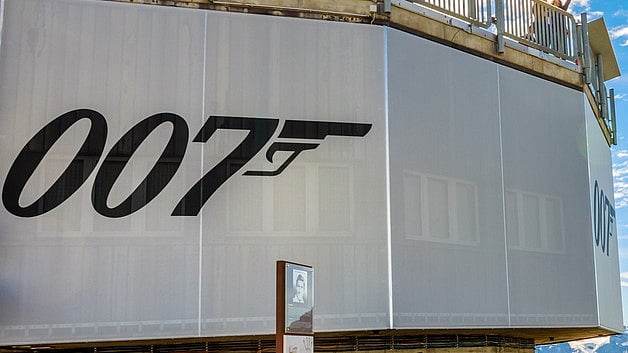
The signature James Bond logo.
By Jason Bailey
Late last year, the Wall Street Journal dropped a bombshell report about one of the biggest stories in the entertainment business: the stagnation of James Bond. When Amazon.com Inc. spent $8.5 billion to buy Metro-Goldwyn-Mayer back in 2022, the crown jewel of the legendary film studio was the venerable super-spy.
But for decades, the character has been controlled by the Broccoli family (first by producer Albert “Cubby” Broccoli, and now by his daughter Barbara), who were reluctant to work with Amazon.
Then, last week, the Broccolis had a change of heart and made a separate deal, ceding creative control to the streamer. Though members of the family did not comment for the Journal story, perhaps the leaks within it were a calculated hardball tactic, allowing them to air their (legitimate) concerns and secure a bigger payday.
While that part may be up for interpretation, the reaction of Bond fans is not. They voiced their concerns on social media, and they are right to be worried. With Amazon at the helm, there’s a risk that the franchise will be ground into dust, exploited for its name, stripped for parts, and then turned into grist for the streaming mill.
After the Journal interviewed more than 20 people familiar with the stalemate, a blisteringly candid portrait of the conflict came into view. According to the report, Barbara Broccoli “has told friends she doesn’t trust algorithm-centric Amazon with a character she helped to mythologize through big-screen storytelling and gut instinct … Broccoli has characterized her thoughts on Amazon this way: ‘These people are f— idiots.’”
Surveying the company’s ideas for the franchise, at least as summarized in the Journal, it’s hard to disagree. Amazon’s plan, it seems, is to take the intellectual property of James Bond and squeeze it for all the juice it can. The company is not interested in making James Bond movies; it’s interested in creating James Bond “content,” a word that was reportedly used in a meeting between Broccoli and an Amazon Studios executive, to Broccoli’s chagrin.
She was right to shudder; there’s no other single buzzword that signifies, with such immediacy and clarity, that its user gives not one whit about art or even entertainment. “Content” is the preferred term of art among Silicon Valley types who see films, television, YouTube videos, TikTok feeds and anything else that people watch on a screen as mere background — white noise to have on while scrolling on their phones and buying things they don’t need.
Any attempts to turn James Bond into content is Amazon’s way of — as ill-advised and increasingly unreliable as it may be — trying to tap into the entertainment industry’s current barometer of success: The creation of a multi-faceted, multi-media franchise, something akin to what Walt Disney Co. has done with their lucrative, pop-culture dominating Marvel and Star Wars franchises. Amazon is so desperate for this specific kind of success that, while waiting for their MGM purchase to bear Bond fruit, the streamer invested a staggering $300 million in Citadel, a would-be multi-series spy franchise, executive produced by Marvel’s go-to guys, the Russo Brothers. (And if you’re wondering how well Amazon has done with that, ask literally anyone you know if they’ve even heard of Citadel, much less watched it.)
The problem with the Marvel model — the Marvel Cinematic Universe — is that it hasn’t worked for anyone but Marvel. When Disney attempted to apply it to the seemingly bulletproof Star Wars franchise, the results were decidedly mixed. The film spin-off Rogue One was a success, but the origin story Solo was a commercial and critical failure, and while the Disney+ Star Wars series The Mandalorian and (to a lesser degree) Andor were well-received, even fans are hard-pressed to summon up much enthusiasm for the likes of Obi-Wan Kenobi, The Book of Boba Fett, The Acolyte or Skeleton Crew.
Using the formula outside of Disney has proven equally tricky.
Elsewhere in superhero land, the woes and failures of trying to turn the arguably more beloved DC Comics stable into a Marvel-style extended universe could fill a book. The original series of Harry Potter movies were box-office blockbusters, but the follow-up Fantastic Beasts films have been so indifferently received that the projected five-installment story appears to have sputtered out after part three. Then there is the forthcoming Potter series on Max that will essentially remake each of the original films into a full season of television, which mostly smacks of desperation.
Even seemingly durable properties like King Arthur and Universal Studios Inc.’s classic monsters were re-launched with the promise of multi-film franchises, only to peter out after their inaugural installments were met with apathy (or even hostility) by moviegoers. The Marvel formula doesn’t even work for Marvel anymore; the brand’s exhaustingly interlocking supply of Disney+ series and spin-off films have made audiences feel as if homework is required to attend the latest Marvel movie, and that feeling is reflected in their dwindling box-office dominance.
The lesson that Amazon should learn, but probably won’t, from Marvel (and Star Wars, and all the rest) is not to flood the zone with “content.” It’s a strategy that may goose subscription numbers and make stockholders happy in the short term, but it makes would-be blockbuster movies into non-events that many viewers ultimately tune out. And if there’s one thing a Bond movie should be, it’s an event. It’s our most durable film series, conjuring visions of dazzling adventure, pretty people, gorgeous locations, and cinematic excitement. What a loss it would be if all that magic were reduced to slop you put on while you’re folding your laundry.